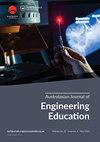Reflecting on a community of practice for engineering education research capacity in Africa: who are we and where are we going?
Q1 Social Sciences
Australasian Journal of Engineering Education
Pub Date : 2023-01-02
DOI:10.1080/22054952.2023.2233340
引用次数: 1
Abstract
ABSTRACT The Engineering Education Research Network in Africa (EERN-Africa) was created to enable connections between practitioners and researchers with a shared interest in African engineering education contexts. Recognising the importance of developing an African voice in the engineering education research space, the EERN-Africa community has interacted in a dynamic and dialogic way with our own teaching and research practices across diverse African contexts, with an ethical commitment to democratic and inclusive community-building. The objective of this paper is to reflect on the current status of the Community of Practice (CoP), and the challenges and opportunities in sustaining and growing the CoP. A collaborative analysis of perspectives on this emerging identity is presented, using an Appreciative Inquiry (AI) methodology and drawing on collective written reflections and discussions. Six broad themes on the value that the CoP has for both individuals and the group were identified: networking, capacity development, emotional support, impact on professional identity, social and environmental impact, and breaking borders. This paper contributes an approach for collaborative capacity-building in EER through a virtual CoP, underpinned by the spirit of ubuntu.反思非洲工程教育研究能力的实践社区:我们是谁,我们要去哪里?
非洲工程教育研究网络(EERN-Africa)的创建是为了使对非洲工程教育背景有共同兴趣的从业者和研究人员之间建立联系。认识到在工程教育研究领域发展非洲声音的重要性,EERN-Africa社区以充满活力和对话的方式与我们自己在不同非洲背景下的教学和研究实践进行互动,并以民主和包容性社区建设的道德承诺。本文的目的是反思实践共同体(CoP)的现状,以及维持和发展CoP的挑战和机遇。本文采用欣赏式调查(AI)方法,并借鉴集体书面反思和讨论,对这一新兴身份的观点进行了协作分析。关于缔约方会议对个人和团体的价值,确定了六个广泛的主题:网络、能力发展、情感支持、对职业认同的影响、社会和环境影响以及打破边界。本文提出了一种以ubuntu精神为基础,通过虚拟CoP进行EER协作能力建设的方法。
本文章由计算机程序翻译,如有差异,请以英文原文为准。
求助全文
约1分钟内获得全文
求助全文
来源期刊

Australasian Journal of Engineering Education
Social Sciences-Education
CiteScore
6.40
自引率
0.00%
发文量
8
 求助内容:
求助内容: 应助结果提醒方式:
应助结果提醒方式:


